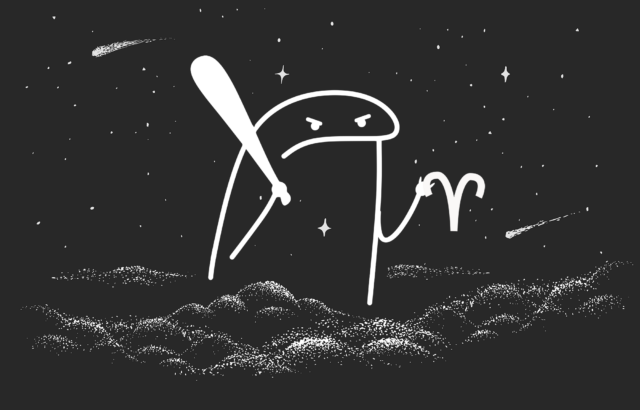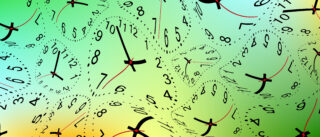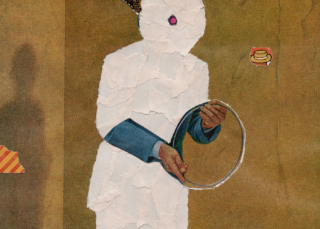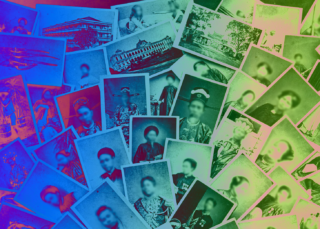Criticism Online
The Stars Say You’re Special
As revealed by the novelist Anna Dorn.
By Daniel Spielberger

Every Sunday night, as the sun recedes, the moon beams, and the sky lights up with glittering constellations, I check Twitter to see what the Astro Poets are forecasting for Aries, my sign, the most confident and passionate of the Zodiac. Founded by poets Dorothea Lasky and Alex Dimitrov, the popular account offers cryptic horoscope-poems, telling Aries for the week of June 12, for instance, “Thoughts go to the farthest places. But you don’t have to go there. A green and yellow sky, an opening. You can stay where you are.” That evening, heeding the universe’s instructions, I decided to max out my ClassPass credits on boutique fitness workouts within a three-block radius. As the days passed, the horoscope became a faint memory until the next Sunday night, when I read what was in store for the week of June 19: “People will see how you are moving along. Only you know what relief silence will bring. There will be noise. But it will be the kind that you make.”
On June 20, backdropped by a blaring Lizzo song and pink fluorescent lights, I let out a defeated grunt at the end of a “Butt and Legs” workout.
Rinse and repeat.
I wonder about the masterminds behind internet astrology, not the Astro Poets specifically but the wider phenomenon of individuals (and companies) who manage to craft predictions that feel specific enough to be satisfying and yet malleable enough to translate for millions. What motivates them? And what motivates me (and countless others) to keep reading even if deep down, we know that none of it really matters?
Enter: Anna Dorn’s latest novel, Exalted, which submerges us in the world of one such cosmic influencer. The novel succeeds because, regardless of how we feel about astrology specifically, Dorn satirizes how most of us are trapped in a social media ecosystem that rewards using pathology to gain a sense of control over our reality. Astrology is just one tool of many that we use to reprogram our subjectivities for a fleeting fix of validation.
Told with alternating narrators, Exalted reflects that online astrology content is a dyad, involving the influencer and the influenced (though the influencer’s side of the story is more fully realized and compelling). Neither is portrayed as particularly sympathetic. The influencer, Emily Forrest, is a thirty-something once-aspiring actress in Los Angeles who runs an Instagram astrology account with hundreds of thousands of followers (@Exalted), while also churning out Buzzfeed horoscope listicles and $200 birth-chart readings. The follower is @Exalted-devotee Dawn Webster, a forty-eight-year-old waitress in Riverside who recently broke up with her ex-girlfriend and medicates with astrology posts, cheap booze, and excuses.
From the get-go, Emily lets the reader in on her dirty little secret — she doesn’t believe in astrology and, like many of us, clings to it because it gives her an arbitrary way to demystify people. “Everyone just wants to hear they’re special, in very specific language,” she confesses. “Astrology is a perfectly nebulous vehicle for this.” Immediately, Dorn is extending her critique beyond astrology to a zeitgeist that constantly dangles simulations for escape. Reminiscing on the days when she could afford to alleviate her woes with psychology, Emily reflects, “My therapist used to say that if you alter your thoughts, you can change your reality…. Acting like I am successful and rich and impressive all night makes me feel like I am in fact successful and rich and impressive.” In these pages, influencers, podcast hosts, therapists, strippers, and astrology meme accounts are one in the same. Give someone a small sum of cash to spout bullshit on a podcast or “read” the stars or shake their ass. If you’re not into astrology, you’ve likely found some other way to feel “successful and rich and impressive.”
Meanwhile, Dawn is a parodic stand-in for the typical consumer easily lured by Hollywood’s delusions. During a simpler time, she may have been obsessed with a talk show host hocking platitudes from a sound stage. Now, the forty-eight-year-old waitress clings to Emily’s meme-heavy astrology account. No matter what’s happening in the terrestrial realm — ex-girlfriend blocking her number, an unchecked anger management problem soaked with alcoholism, a court-appointed therapist, dead-end jobs, an apathetic son, an estranged baby daddy — in the cosmos, her ego, rather than her actions, is all that matters. When @Exalted lies to Webster that her birth chart gestures towards future stardom, she proclaims, “This is exactly what I needed, confirmation that my current issues have nothing to do with me. It’s everyone else who has the problem.”
There’s some power imbalance here — Emily defining the shape of Dawn’s fantasies — but Emily’s cynical puppeteering doesn’t immunize her from projection in her own private life. While Dawn turns to astrology, Emily develops a parasocial crush on one of her Instagram clients, Beau Rubidoux, a photographer who she believes is a “divine intervention” because of his “beautiful” and “exalted” birth chart. She compares the crush with her teenage fascination with Edward Scissorhands, but this time around, since he’s a real person, there’s the illusion that some day it can be more than one-sided. After succumbing to envious fantasies about the girls Beau is possibly photographing, Emily pieces together a theory for her behavior:
My instinct is to cite my Scorpio possessiveness, but my therapist would probably cite my OCD. I read on Instagram that being in love causes a sudden rise in dopamine, which triggers an increase in cortisol and norepinephrine, which in turn causes a sharp drop in serotonin, and the new serotonin levels match those with OCD. So being in love gives everyone OCD.
If you scroll through TikTok, Twitter, or Instagram, you will likely be bombarded with some version of that stream of consciousness — it’s a testament to Dorn’s wit and cultural savvy that she recreated it so convincingly. Due to an army of self-proclaimed experts posting content, the DSM-V is now a choose-your-own-adventure. Whether it’s obsessing over an ex, getting mad at a friend for chewing too loudly, or refusing to do the dishes, there are a myriad of diagnoses you can claim. Having ADHD and being a Virgo are of course, very different things. But in online spaces, they are conceptually and cosmically linked because they serve as crutches for behavior. Everything points to the same North Star — the less personal accountability, the better. In Rebecca Jennings’ deep-dive on our culture of self-pathologization for Vox, she concludes that due to creepily attentive algorithms, social media users’ desire to organize around identity, and platforms’ penchant for flame wars, mental illness has become “a subculture, complete with its own vocabulary that only those in the know can use and weaponize.” This poses a risk to legitimate diagnosis. Describing psychology “as just astrology for the independently wealthy,” Emily doesn’t take it too seriously and dismisses OCD as “not chic.” She says that she’d rather have depression because her idols Winona Ryder, River Phoenix, and Virginia Woolf all suffered from it — much more glamorous.
In the parallel narrative, Dawn casually mentions that she disagrees with therapists who have told her she has “abandonment issues” and “Borderline Personality Disorder.” Unlike with online astrology, these diagnoses also come with the dreariness of taking tangible actions to improve. She muses, “My personality isn’t disordered. Everyone loves my personality.… How was it my issue that everyone always left me?” Even if her son makes fun of her for Instagram habit because she’s forty-eight, her narcissism is the youth’s lingua franca. She touts her Leo status (the “leaders of the Zodiac”) to confirm her fantasy that everyone else is a little jealous of her. Through letting the reader in on how these troubled, albeit hilarious, protagonists justify their self-sabotaging spirals, Dorn peels back on how we construct personhood online. Dawn and Emily sit at opposing levels on the internet’s totem pole but are motivated by similar mindsets, embracing random tidbits of wisdom when it’s the most convenient and rejecting it when the truth is too much to bear.
What’s the worst that could happen from all this postponement or outright refusal of reality? Well, the trajectory of Exalted warns that the culture is always just a few clicks from disaster — the ground can fall out from under you all at once. The stakes appear largely insignificant until Emily takes her own astrological prophecies literally and acts upon her fixation with Beau. After fooling countless people into believing that they are destined for greatness because of the alignment of the moon, planets, and sun, Emily gets a taste of her own medicine. She follows the stars and stumbles into an incestual tryst (I am so sorry, as a Libra moon, I’m not good at keeping spoilers to myself). Mocking any notion that a deus-ex-machina event could save us, the climax makes a cruel example out of Emily — the peddler of easy-way-outs.
Discussion about how social media’s algorithm can shape us conjures fantasies of tech titans gathered in a smoke-filled underlayer, programming our misery. But by hewing closer to the everyday, crafting a narrative that feels more bleak than dystopian, Dorn sidesteps the plutocrats (though Emily describes SpaceX as “a bunch of Pisces launching rockets into the sky”) and tackles the serfs striving to be feudal lords who get skewered because if it weren’t for them, none of this content would exist.
Though reading a novel filled with insufferable, ordinary basket-cases is likely off-putting for some, that’s probably by design. Dorn likes to make readers feel trapped within her characters’ dysfunction. She has previously considered reinvention as a means of escape in her oeuvre. Bad Lawyer, her memoir, is a tongue-in-cheek account of her decision to swap a legal career for being a writer because she realized that she went to law school due to societal and familial pressures. Vagablonde, her debut novel, told the story of how Prue, a thirty-year old white attorney, becomes a mediocre internet rapper so she can tap into a long, lost reservoir of confidence. Exalted might be a bit more dispiriting, as the characters don’t radically transform their external conditions or identities but rather find a shared language to reframe their misery, running in place with rose-colored glasses. Perhaps the novel could have benefited from a convincing foil, someone who nonchalantly dabbles in mysticism without becoming a sentient Pinterest board. But then it might be a different novel entirely.
Is everyone truly destined to seek validation on these platforms run by people who don’t really care about us? Should we take astrology seriously or shouldn’t we? Dorn posits that what we crave isn’t an answer to our problems, but the deranged joy of seeking shelter in a hastily constructed architecture of order. It could be astrology, but it could also be idolizing an Instagram crush or latching onto some vaguely scientific wisdom about how “walking does good things for the brain” because Thoreau, Beethoven, and Woolf once took strolls in between actually accomplishing things. We want an ideology, or way of structuring life, that’s too laissez-faire to be considered religious, and yet worlds away from the rationality of Earth’s gravity. And with that wiggle room, comes fickleness; we proudly brandish labels until we don’t, when our scrolling leads us elsewhere. As evidenced by Emily’s decreasing follower count and net worth, astrology’s popularity is waning. At the end of the novel, her career only gets a lucrative second wind once she pens a viral VICE polemic about “Why Astrology Is Bullshit” and rebrands herself as prophet-turned-cynic, explaining how once there was a time when astrology both made her money and rendered fellow humans “less frightening” but now, she totally knows better so you should totally trust her and totally keep clicking on her articles.
Despite the persistent onslaught of memes, listicles, and cosmic truisms, astrology’s real-life condition is quite analogous to its declining status in Exalted. During the last few years, the practice’s millennia-old mystique has been subsumed by market forces. Co–Star — an astrology social network that’s notorious for sending users opaque push notifications — is actually powered by AI. In 2018, Astro Poets faced backlash when they partnered with Airbnb to write “travel horoscopes” that matched cities and their rentals with zodiac signs. Twitter critics claimed that they were promoting gentrification and exploitative landlords. Though that all may be true, much like an investment property, the point of content is monetization — why pretend horoscopes should be any different? Pages before she trashes the entire enterprise for a paycheck from VICE, Emily lobs one lukewarm attempt at an answer: that the stars transcend race, gender, and class distinctions. Coming from her, however, this stab at egalitarianism is disingenuous.
And her vacuity very much extends offline. In a scene at the end of the first act, broke and eager to impress her parents, Emily asks her hookup buddy to act like her boyfriend at a family dinner in a stuffy restaurant. He plays the part of a wealthy consultant and backs up her absurd falsities that she’s starring in an artsy A24 slasher and is Elon Musk’s astrologer. Following the meal, in the midst of giving her fake boyfriend a tragically transactional blowjob, she contemplates whether this is how “Gwyneth Paltrow felt when she got off Harvey Weinstein. Not ideal but well worth it. She got an Oscar after all.”
The joke jolts you in its brilliant deadpan delivery, revealing Exalted’s underlying ethos. We survive by deluding ourselves into believing that these cycles of exploitation are “well worth it.” As Sigmund Freud or Co–Star may proclaim, everyone falls victim to projection. Social media is populated with #hustle memes about how ridiculously successful people — J. K. Rowling, Jeff Bezos, Walt Disney, Barack Obama — were broke losers in their twenties. The logic behind these posts is faulty at best. Deep down, we all know that our sprawling autofiction manuscript is no match for Harry Potter. And didn’t Bezos use inherited wealth to start Amazon? But none of that matters. In despair, any piece of content — whether it’s stripped from the bowels of Wikipedia or the sky — has potential for meaning. Hope is a distant constellation. If you just squint long enough, you will see your very special future shining bright.


